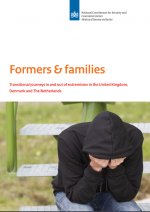
Formers & families
Omschrijving
Transitional journeys in and out of extremisms in the United Kingdom, Denmark and The Netherlands
This report presents the outcome of research conducted as part of “Formers and Families”, a two-year project made possible financially by the European Union, the Dutch ministry of Security and Justice, the UK Home Office and the Danish Ministry of Integration, Immigration and Housing. To investigate the possible role that family members play in the processes of radicalisation and de-radicalisation of adolescents and young adults, researchers from the UK, Denmark and the Netherland collaborated to study whether the development of radicalisation is influenced by the pedagogical climate within the family, and by the responses of parents and other ‘educators’ during the process of radicalisation. Due the extreme difficulty of reaching the target group, much of research into radicalisation is based on secondary sources, such as intelligence reports. Research which actually allows the voices of parents to be heard is particularly rare. The ‘Formers and Families’ study aims to fill this hiatus: 30 cases were investigated in the three participating countries, with around 60 interviews conducted with individuals who had left active radicalism behind them, as well as with at least one of their close family members. Although the qualitative character of the study forestalls any claim to representativeness, the research does present enriching insights which lead to a better understanding of the radicalisation process itself and further social, pedagogical and policy responses to this phenomenon.
In dit rapport beschrijven we een studie naar de mogelijke rol die familieleden spelen bij het proces van radicalisering en deradicalisering van jonge mensen. In het project Formers & Families, financieel mogelijk gemaakt door de Europese Unie, het Ministerie van Veiligheid en Justitie, de Britse Home Office en het Deense Ministerie van Integratie, Immigratie en Huisvesting, werkten onderzoekers uit het Verenigd Koninkrijk, Denemarken en Nederland samen om een antwoord te krijgen op de vraag in hoeverre de ontwikkeling van radicalisme wordt beïnvloed door het opvoedingsklimaat in het gezin en de reacties van ouders, familie en andere ‘opvoeders’. Veel onderzoek naar radicalisering is, vanwege de extreem moeilijke ‘bereikbaarheid’ van deze groep, gebaseerd op informatie uit de tweede hand, bijvoorbeeld via rapportages van veiligheidsdiensten. Onderzoek waarbij ook familieleden aan het woord komen is bovendien nog eens extra schaars. Het unieke van de Formers & Families studie is dat deze twee lacunes konden worden vermeden. In de drie landen werden bij elkaar circa 60 interviews gehouden met individuen die hun actieve radicalisme inmiddels achter zich hadden gelaten, en in elk geval éen van hun naaste familieleden. Hoewel de studie vanwege het kwalitatieve karakter en de beperkte steekproef geenszins representatief genoemd mag worden, levert zij wél een aantal verrijkende inzichten op die van groot belang kunnen zijn voor een beter begrip van radicaliseringsprocessen zèlf, als ook voor de ontwikkeling van sociale, pedagogische en beleidsmatige reacties daarop
